City of Chandler Small Business Guide





Since its founding in 1912, the City of Chandler has been a forward-thinking community built on entrepreneurial spirit, innovation and hometown traditions.
A long-held vision of thoughtful, constructive and consistent planning has helped transform Chandler into one of the strongest economic centers in the region, state and nation. Chandler’s proactive leadership, business-friendly environment, worldclass labor force and market reach have made it an attractive base for internationally recognized companies and new start-ups spanning a wide range of industries.
Outside of work, our community is passionately committed to developing a sense of place that draws new visitors and enriches the lives of our residents. An enviable, award-winning quality of life is provided through friendly neighborhoods, great schools, and one-of-a-kind shopping, dining, recreation and entertainment experiences.
Year after year, large and small companies along with thousands of talented residents make the decision to call Chandler home. We encourage you to read on, experience Chandler for yourself, and discover why you, too, should become part of this vibrant community.
Attractive, Diverse, Educated and Growing Community

Population Growth
309,100
2030 Projected Population
275,987
2020 Census
236,123
2010 Census
176,581
2000 Census
90,533
1990 Census
Data
Data Source:
National Community Rankings (2022-24)
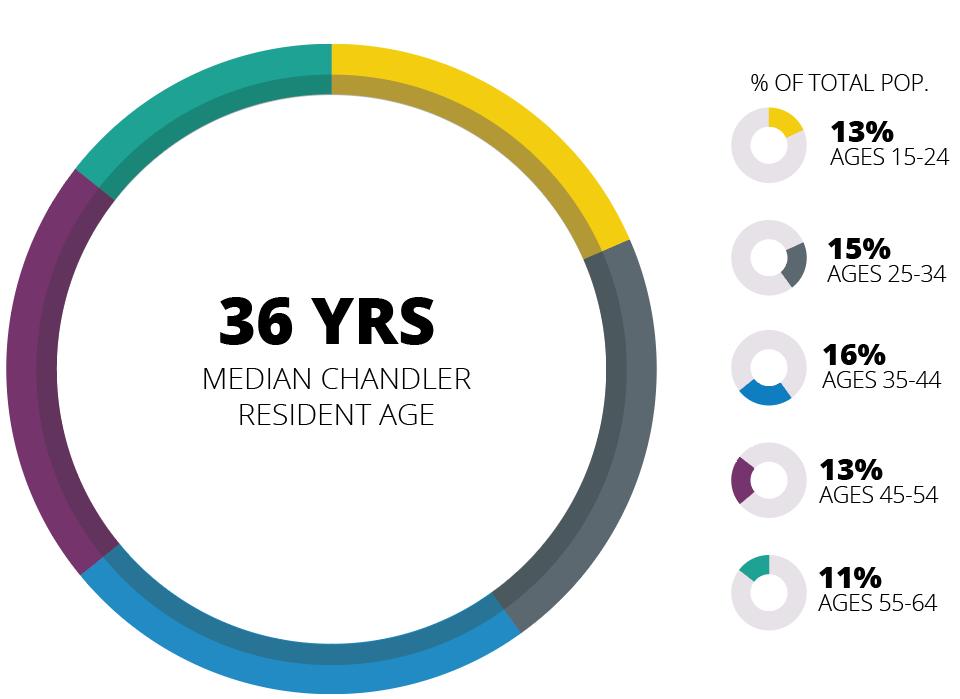
Data Source: ESRI Business Analyst 2023
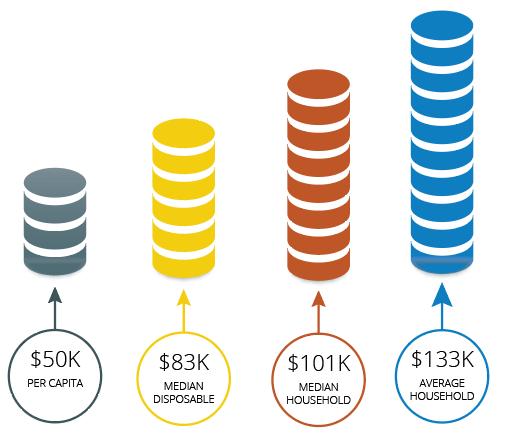
Data Source: ESRI Business Analyst 2023

Data Source: ESRI Business Analyst 2023
Twenty-three percent of Chandler residents identify as Spanish, Hispanic or Latino. These people may be of any race.
Data Source: ESRI Business Analyst 2023
The City of Chandler Economic Development Division promotes the city as a preferred location for new and expanding businesses. Our primary purpose is to enhance employment opportunities and improve Chandler’s tax base by focusing on industrial, office, retail and tourism development. Our responsive team of professionals offers services tailored to support the business and commercial real estate community. Partnering with the Arizona Commerce Authority, Arizona Office of Tourism and the Greater Phoenix Economic Council (GPEC), we market Chandler domestically and internationally with the purpose of attracting new business investment and new job creation to our city. In addition to maintaining a strong job base, we work to create a diverse mix of quality retail and tourism experiences. The Economic Development Division partners with the Chamber of Commerce to establish relationships with Chandler’s existing businesses. We continually assess the needs of existing business with an eye toward developing solutions that will increase economic growth within our community.
We are here to:
• Provide data to help you make informed business location decisions
• Connect you with other appropriate city offices and resources
• Assist with development and/or occupancy processes
Chandler’s Public Library System consists of four branches spread throughout the city to ensure the availability of information resources. The libraries are equipped with current computer systems that provide direct access to business sites via the Internet, as well as subscription database titles. Anyone who has a library card and a pin can access the following business resources:
• Reference Solutions (formerly Reference USA)
A powerful online reference and research tool providing library cardholders instant, real-time access to accurate, in-depth information on U.S. businesses (59 million) and U.S. residents (310 million). Evaluate new business opportunities, research executives and companies, find news articles, conduct job searches, research papers, locate addresses and phone numbers, conduct market research and much more.
• All four libraries have books and audiosbooks about small business start-up, entrepreneurship, finance, marketing, law, sales, personnel and other relevant topics. Free downloadable materials are also available through the Greater Phoenix Digital Library. Visit www.chandlerlibrary.org
• Library staff can help with locating materials and conducting database searches. Call the Reference Desk for assistance or visit www.chandlerlibrary.org, click on “Hours and Contact”, then click on “Ask a Question” to receive an answer to your query via e-mail.
The City’s Diversity Office works closely with the Chandler Human Relations Commission to develop diversity programs and events that support the mission of promoting mutual respect and inclusion in Chandler. Along with members of the community, the Diversity Office works toward the elimination of prejudice and discrimination; and to promote amicable relations among all racial, cultural, religious, age, gender, disabled, socioeconomic and national groups in Chandler.
The Diversity Office maintains relationships with organizations that seek to promote the success of minority-owned small businesses, and staff can provide referral assistance to interested parties.
The Business Location Team (BLT) is a free resource that is available to help office, industrial and retail businesses navigate the tenant improvement processes.
Knowledgeable city staff will conduct a site tour with you to identify and explain:
• Development issues that may be expensive and/or time intensive
• Pertinent city code requirements (building and zoning codes)
• Development process steps through Certificate of Occupancy
• Review timelines, submittal requirements, fee requirements, permit requirements, and inspection requirements
Maricopa County East Valley Career Center
Arizona @ Work helps area businesses succeed in securing qualified talent, training current employees to use new industry technology, and providing lay-off aversion resources and transition strategies.
The Arizona Commerce Authority (ACA) is a resource for information and referrals at every step of the small business development process. The office also provides minority and women business owners with information on relevant business programs and services.
The ACA provides a variety of resources to assist entrepreneurs, including information and statewide resources for starting, operating and growing a business in Arizona. The ACA online program at www.azcommerce.com/smallbiz provides you with a customized step-by-step checklist of what you need to know, whom you need to contact and where you need to go for business licensing, registration, tax requirements, funding, hiring, certification, procurement opportunities and business resources.
To be certified as a Minority-, Woman-owned, Small and Disadvantaged Business Enterprise, a company must meet all qualifying standards and be at least 51 percent owned, operated and controlled by a qualifying person or persons. Organizations providing certification and registration programs for minoritywoman-owned, small and disadvantage businesses are listed at www.azcommerce.com/smallbiz
The Arizona Small Business Advocate is the Executive Director of the Governor’s Council on Small Business (GCSB). The Advocate is responsible for keeping an open line of communication among the Governor, the Director of the ACA, the GCSB and the Arizona small business community. The Advocate and GCSB work with chambers of commerce and other groups to develop recommendations for policies and programs addressing fundamental issues related to small business in Arizona.
Provides a vast array of services including resume referrals, job listings, on campus recruitment, pre-recruiting information, job fairs and information sessions.
The Chandler Chamber of Commerce is a private, nonprofit business organization that has been servicing the business community since 1912. The Chamber is an important advocate for the business community and a primary source of networking opportunities in Chandler.
College & University Assistance
Colleges and universities have many programs that are designed to help build the local economy. They also have access to vast amounts of information through their research and databases. Some of the top-notch colleges and universities include:
Arizona State University is one of the largest public universities by enrollment in the United States. As of fall 2023 ASU has more than 145,000 students across five Greater Phoenix campuses, four regional learning centers throughout Arizona and its ASU Online programs.
Chandler-Gilbert has three East Valley campuses and is part of the Maricopa County Community College system. They serve nearly 140,000 students annually. Customized training and various services for small businesses are offered at the Pecos Campus.
Grand Canyon University ABSN Program learning site in Chandler is a satellite location of Grand Canyon University (GCU), A Phoenix-based private university rooted in Christian Values. The 16-month Accelerated BSN program builds on students’ non-nursing college education to put respected nursing education well within reach. Designed exclusively for accelerated nursing students, the Chandler facility features state-of the-art skills and simulation labs, classroom space, computer labs, faculty offices and student lounge. Visit www. gcu.edu/degree-programs/absn-accelerated-bsn/arizona/ phoenix for more information.
The University of Arizona, has a total enrollment of more than 53,000 students as of fall 2023. UA’s main campus is in Tucson but the university has an expanding presence in Greater Phoenix, which includes its UA Chandler facility.
The UA’s Near You Network Location in Chandler offers undergraduate and graduate programs that align with indemand skills and area industry workforce needs. Visit www. nearyou.arizona.edu/chandler for additional information.
The city and ASU’s J. Orin Edson Entrepreneurship + Innovation Institute have partnered to launch the Chandler Endeavor Venture Innovation Incubator. Based at the ASU Chandler Innovation Center in Downtown Chandler, this free program offers six-month cohort tracks with customized strategy development, monthly topic-driven workshops, access to prototyping equipment, and dedicated office space for clients. Visit www.entrepreneurship.asu.edu/programs/chandlerendeavor-incubator for additional information.
The ASU Chandler Innovation Center also houses the E+I@ACIC coworking space, which provides entrepreneurs with access to free workspace in the heart of Downtown Chandler.
Visit www.entrepreneurship.asu.edu/spaces/asu-chandlerinnovation-center for additional information.
of Chandler Resources
Chandler Economic Development Division
175 S. Arizona Ave., 5th Floor
Chandler, AZ 85225
Phone: 480.782.3030
Email: economicdevelopment@chandleraz.gov
Web: www.chandleraz.gov/ed
Chandler Public Library
Basha Library
5990 S. Val Vista Dr.
Phone: 480.782.2850
Downtown Library
22 S. Delaware St.
Phone: 480.782.2803
Hamilton Library
3700 S. Arizona Ave.
Phone: 480.782.2828
Sunset Library
4930 W. Ray Rd.
Phone: 480.782.2842
Chamber Resources
Arizona Hispanic Chamber of Commerce
1020 E. Missouri Ave.
Phoenix, AZ 85014
Phone: 602.279.1800
Web: www.azhcc.com
Asian Chamber of Commerce
7217 N. 6th Way
Phoenix, AZ 85020
Phone: 602.529.8475
Web: www.azasianchamber.com
Chandler Chamber of Commerce
101 W. Commonwealth Ave.
Chandler, AZ 85225
Phone: 480.963.4571
Toll Free: 800.963.4571
Web: www.chandlerchamber.com
Chinese Chamber of Commerce of Arizona
PO Box 32865
Phoenix, AZ 85064
Web: www.cccofaz.org
Greater Phoenix Chamber of Commerce
201 N. Central Ave., Suite 2700 Phoenix, AZ 85004
Phone: 602.495.2195
Web: www.phoenixchamber.com
Chamber Resources Continued
The Black Chamber of Arizona
2390 E. Camelback Rd., Suite 130 Phoenix, AZ 85016
Phone: 602.307.5200
Web: www.blackchamberaz.com
The U.S. Chamber of Commerce
Small Business Center
Web: www.uschamber.com
US Women’s Chamber of Commerce
700 12th St., NW, Suite 700 Washington, DC 20005
Toll Free: 888-41-USWCC
Web: www.uswcc.org
Education Resources
Arizona State University Tempe Campus
1151 S. Forest Ave. Tempe, AZ 85281
Phone: 855.278.5080
Web: www.campus.asu.edu/tempe
ASU Career & Professional Development Services
1151 S. Forest Ave., Room 329 Tempe, AZ 85287
Phone: 480.965.2350
Google Search Terms: ASU Career and Professional Development Services
Chandler Endeavor Venture Innovation Incubator E+I@ACIC Coworking Space 249 E. Chicago St. Chandler, AZ 85225
Phone: 480.884.0302 Email: Info.ACIC@ASU.edu Web: entrepreneurship.asu.edu/programs/chandlerendeavor-incubator
Chandler-Gilbert Community College - Pecos Campus
2626 E. Pecos Rd. Chandler, AZ 85225
Phone: 480.732.7000
Web: www.cgc.edu
Grand Canyon University 4100 W Chandler Blvd suite 100 Chandler, AZ 85226
Phone: (866) 483.6578
Web: https://www.gcu.edu
University of Arizona (UA) Chandler Near You Network Location 55 N Arizona Pl. Chandler, AZ 85225
Phone: (520) 626.1702
Web: www.nearyou.arizona.edu/chandler
Arizona Commerce Authority
Small Business Services
100 N. 7th Ave., Suite 400
Phoenix, AZ 85007
Phone: 602.845.1200
Web: www.azcommerce.com
Arizona Small Business Association (ASBA)
11811 N. Tatum Blvd., Suite P-195 Phoenix, AZ 85028
Phone: 602.306.4000
Web: www.asba.com
Maricopa Small Business Development Center (SBDC)
George Kimble, Business Analyst
Main Office: Gateway Community College 108 N 40th St. Phoenix, AZ 85034
Phone: 480.784.0601
Copper State Workspace @ Desert Coffee Co.
5865 W Ray Rd., Suite 7
Chandler, AZ 85226
Phone: 480.466.0116
Email: sayhi@desertcoffee.co
E+I@ACIC Coworking
249 E Chicago St.
Chandler, AZ 85225
Phone: 602.448.9110

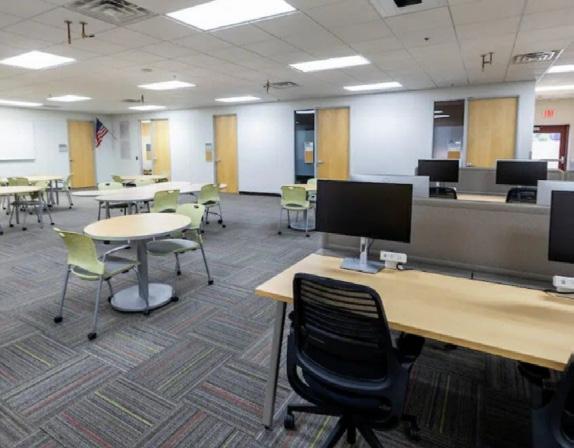
Executive Suites Chandler
6909 W Ray Rd., Suite 15
Chandler, AZ 85226
Phone: 602.550.4842
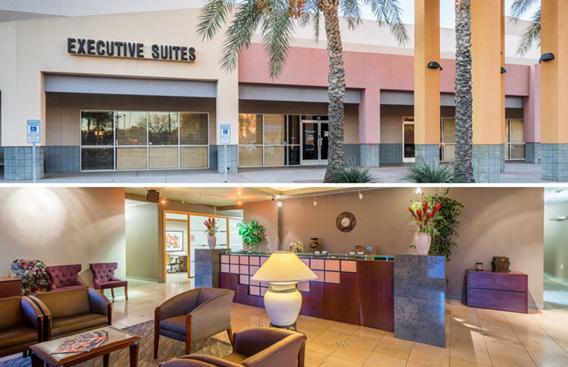
Expansive @ Cooper Crossing
1820 E Ray Rd.
Chandler, AZ 85226
Phone: 480.656.8300
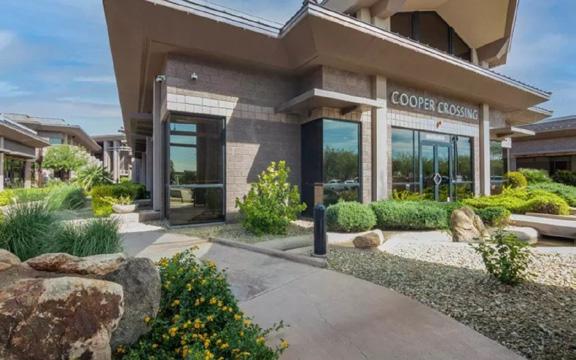
Web: www.maricopa-sbdc.com/our-team/george-kimble/
Contact: George Kimble, Business Analyst
Email: george.kimble@domail.maricopa.edu
Workforce Resources
Arizona @ Work
1001 West Southern Ave., Suite 101 Mesa, AZ 85210
Phone: 480.792.6924
Web: www.arizonaatwork.com
Chandler Career Center
Workforce Development Project Manager
Phone: 480.782.3041
Email: info@pipelineaz.com
Web: www.chandlercareercenter.pipelineaz.com
Copper State Workspace @ Desert Coffee Co. offers private work rooms and conference room use inside a coffee shop environment.
Visit desertcoffee.co for more information on services and amenities.
E+I@ACIC Coworking offers free coworking space housed in the ASU Chandler Innovation Center (ACIC) and co-located with the Chandler Endeavor business incubator program. Features include 16 open workstations with monitors, reservable conference room with AV equipment, two private meeting areas, and moveable table clusters.
Visit the ACIC website for more information.
Executive Suites Chandler offers fully furnished office suites, collaborative spaces, virtual offices, and conference rooms.
Visit executivesuiteschandler.com for more information on services and amenities.
Expansive @ Cooper Crossing offers smart suites, private offices, dedicated desks, coworking memberships and conference rooms.
Visit expansive.com for more information on services and amenities.
Fuse Flex Space
2700 S Gilbert Rd., Suite 5
Chandler, AZ 85286
Phone: 480.925.2334

MyCityOffice
2250 E Germann Rd., Suite 12
Chandler, AZ 85286
Phone: 480.945.4546
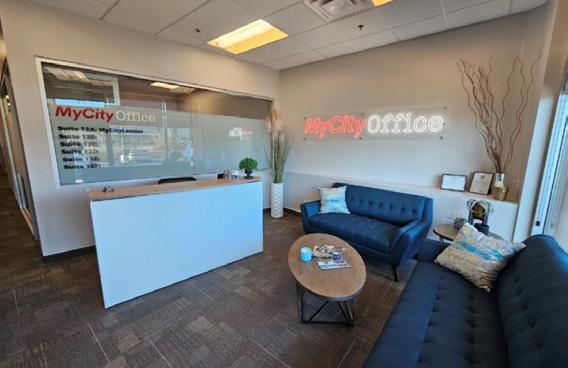
Palette Collective
505 S Chandler Village Dr. Chandler, AZ 85226
Phone: 915.293.6333
Regus
3100 W Ray Rd., Suite 201
Chandler, AZ 85226
Phone: 864.214.9978

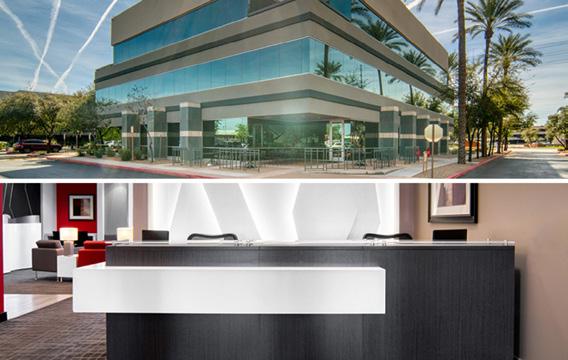
The Forum
2301 S Stearman Dr. Chandler, AZ 85286
Phone: 480.686.0476
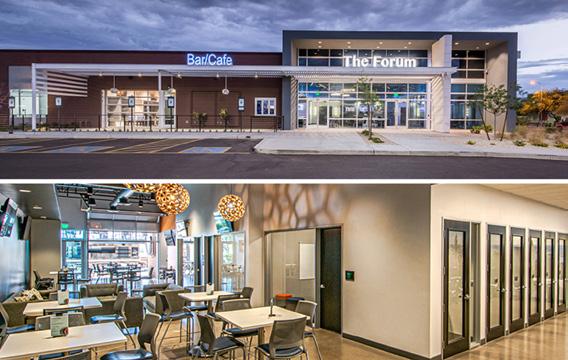
Workpliciti
3377 S Price Rd. Chandler, AZ 85248
Phone: 602.448.9110
Workuity
3133 W Frye Rd., Suite 100
Chandler, AZ 85225
Phone: 480.745.2515
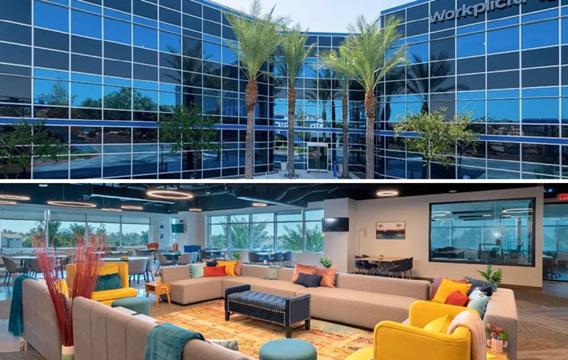
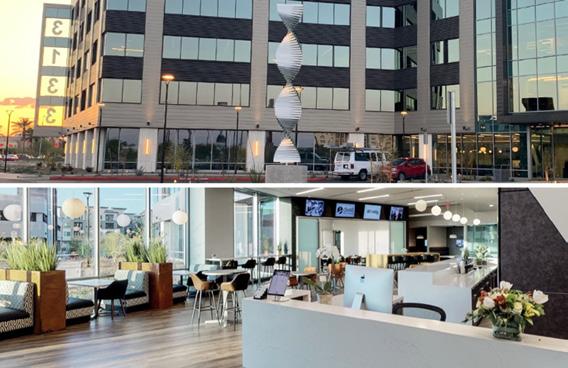
Fuse Flex Space offers private offices and divisible warehouse space for businesses with storage, light assembling or distribution needs.
Visit fuseflexspace.com for more information on services and amenities.
MyCityOffice offers private offices, podcast studio rental, conference room rental, multiple membership types (full-time, part-time, day pass)
Visit mycityoffice.co for more information on services and amenities.
Pallette Collective innovative studio coworking concept offers customizable spaces for entrepreneurs in the hair, beauty, food, beverage and retail industries.
Visit palettecollective.studio for more information.
Regus offers private offices, coworking desks, meeting rooms, and virtual office options.
Visit regus.com for more information on services and amenities.
The Forum offers private offices rentals, conference room rentals, and all-day meeting packages.
Visit theforumcomplex.com for more information on services and amenities.
Workpliciti offers private offices, dedicated desks, hot desk, and virtual office options
Visit workpliciti.com for more information on services and amenities.
Workuity offers offers private offices, dedicated desks, and hot desk options.
Visit workuity.com for more information on services and amenities.
Startup Introduction
Starting a business can be an overwhelming task, but approaching it in a thoughtful, thorough way can help to make the process less daunting. This guide is a compilation of information designed to provide both information and to lead you to further resources. We encourage you to look at, examine and research many resources to gain as many ideas and perspectives as possible. The Business Resources pages at the end of each section will help you do this.
Business Startup Checklist
Conduct market research
Market research will tell you if there’s an opportunity to turn your idea into a successful business. It’s a way to gather information about potential customers and businesses already operating in your area.
Write your business plan
Your business plan is the foundation of your business. It’s a roadmap for how to structure, run, and grow your new business.
Fund your business
Your business plan will help you figure out how much money you’ll need to start your business.
Retain an attorney and CPA, if appropriate
Choose a business structure
Decide whether you wish to operate as a sole proprietorship, partnership or corporation. The legal structure you choose for your business will impact your business registration requirements, how much you pay in taxes, and your personal liability.
Check on zoning ordinances
Pick your business location
Your business location is one of the most important decisions you’ll make. Whether you’re setting up a brick-and-mortar business or launching an online store, the choices you make could affect your taxes, legal requirements, and revenue.
Choose your business name
It’s not easy to pick the perfect name. You’ll want one that reflects your brand and captures your spirit. You’ll also want to make sure your business name isn’t already being used by someone else.
Obtain a Federal Employer Identification Number (EIN), if needed
You’ll use your employer identification number (EIN) for important steps to start and grow your business, like opening a bank account and paying taxes. It’s like a social security number for your business.
Find a bank that is right for you, and open business bank account
Acquire necessary licenses and/or permits for state, county and/or city
Keep your business running smoothly by staying legally compliant.
See insurance agent for full range of coverage
Obtain bonding and insurance, if necessary
Arrange for utilities, telephone and other services
Review all labor regulations, if hiring employees
Protecting your business (includes common scams, cybersecurity, keeping customers’ data safe)
Choose a record keeping system and method of inventory control
A written guide to starting and running your business is essential. This plan will help with securing loans, assessing growth and charting your next steps.
One decision that business owners need to make early in their business planning process is which legal form of business to choose. Before reaching this decision, a thorough understanding of the advantages and disadvantages of each legal structure is important. Business owners will need to consider the legal and tax-related implications of each form of business and determine which best fits their needs. It is recommended that you seek advice from an attorney and/or certified public accountant before making this decision.
Business structures available in the State of Arizona include:
• Sole Proprietorship
• General Partnership
• Limited Liability Company (LLC)
• Limited Partnership (LP)
• C Corporation
• S Corporation
*See chart on page 15 for a business comparison grid structures.
• Description • Marketing Plan
• Competition
• Operating Procedures
• Personnel • Business Insurance
• Loan applications
• Capital equipment and supply list
• Balance sheet
• Breakeven analysis
• Pro-forma income projections (profits & loss statement)
- Three-year summary
- Detail by quarters, second & third year
• Assumptions upon which projects were based
• Pro-forma cash flow
•
Tax returns of principals for the last three years Personal financial statement (all banks have these forms) For franchise businesses, a copy of franchiser contract & all supporting documents provided by the franchiser Copy of proposed lease or purchase agreement for building space
Copy of licenses & other legal documents
Copy of resumes of all principals
Copies of letters of intent from suppliers, etc.
A sole proprietorship is the simplest and most common form of business organization. It is defined as a business that is owned by one individual. The creation of a business as a sole proprietorship requires no formal Arizona filing. Profits and losses are reported on a separate schedule within your personal tax return.
A general partnership is an association of two or more persons joined together to carry on trade or business for profit. Each partner may contribute skills, money and/or time, and each shares in the company’s profits and losses. Earnings are reported at the end of the year with personal tax returns.
The partnership’s existence is usually formalized through preparation of a written agreement. In general, agreements outline each partner’s share of income, gain, loss, deductions, credits and methods to dissolve the partnership under various situations. It is not required to file your agreement with the state.
A limited liability company (LLC) is a flexible form of enterprise that blends elements of the partnership and corporate structures. LLCs are popular because, similar to a corporation, owners have limited personal liability for the debts and actions of the LLC. Other features of LLCs are more like a partnership, providing management flexibility and the benefit of pass-through taxation.
Owners of an LLC are called members. There is no maximum number of members. LLCs are required to file with the Arizona Corporation Commission.
(LLLP)
Arizona’s limited liability partnership statutes (A.R.S. § 29-1101, et seq.) govern both limited liability partnerships (LLPs) and limited liability limited partnerships (LLLPs) and permit both general partnerships and limited partnerships to elect limited liability for their general partner(s). The owners report company profits and losses on their personal income tax forms. The business itself is not subject to a federal income tax, as corporations are.
To ensure that all legal requirements are satisfied, it is a good idea to consult an attorney to organize these types of partnerships. LLPs and LLLPs are required to register with the Arizona Secretary of State.
The limited partnership (LP) has become an increasingly popular choice for business owners, especially those involved in real estate or other investment ventures. Unlike general partnerships, LPs can limit the liability and the involvement of certain partners. This is useful for attracting investment partners who would like to participate in the profits of the business but not necessarily in its risks or daily operations.
The profits and losses in a limited partnership flow through the business to the partners, all of whom are taxed on their personal income tax returns. LPs are required to register with the Arizona Secretary of State.
A corporation is the most complex type of business organization. It is formed by law as a separate entity, completely distinct from those who own it, and has its own rights and responsibilities.
The primary advantage of incorporating lies in the area of liability. A corporation has its own legal identity, completely separate from its owners. The corporation safeguards the business owner’s personal assets, and its protection alone justifies the additional expense and paperwork.
In forming a corporation, potential shareholders usually offer money and/or property in exchange for capital stock. The shareholders are the owners of the corporation, and the directors and officers of the corporation may or may not be shareholders. Corporations are required to file with the Arizona Corporation Commission.
An S corporation, sometimes referred to as a “Subchapter S corporation,” allows you the protection of a corporation with some of the financial flexibility of a partnership and elects not to be subject to federal corporate income tax.
The shareholders, however, include their shares of the corporation’s items of income, deduction, loss and credit, or their shares of non-separately computed income or loss, as part of their personal income.
To qualify as an S corporation, a corporation must meet the following:
• It must be based in the United States
• It must have only one class of stock
• It must have no more than 75 shareholders
• It cannot have any nonresident alien as a shareholder
A corporation that meets all of the above criteria can become an S Corporation.
Arizona allows the formation of a non-profit corporation, but if the corporation intends to be tax-exempt, it must apply for that status through the Internal Revenue Service (IRS). There are more than a dozen different types of corporations approved by the Internal Revenue Service as “tax-exempt non-profit.” These organizations usually are developed and operated exclusively for one or more of the following purposes: charitable, religious, educational, scientific, literary, testing for public safety, fostering amateur sports competition (under certain restrictions), or the prevention of cruelty to children or animals. The organization may be a corporation, community chest fund or foundation. A sole proprietorship or partnership may not qualify. Non-profit corporations are required to file with the Arizona Corporation Commission.
If you were asked to name the first computer chip business that comes to mind, who would it be? Intel perhaps. What about a tire manufacturer? Probably Goodyear Tire Company. Having name recognition or what is commonly referred to as “Top of Mind Awareness” is essential in today’s world of intense competition and constant advertising. It all begins with selecting the right business name. There are several factors to consider when choosing a name for your business, such as:
• Is the name already in use?
• Name type - descriptive or non-descriptive
• Ease of use - easy to spell and pronounce
• Positive connotation - Goodyear for Goodyear Tire
Register your business name by visiting the Secretary of State’s website at www.azsos.gov/business/tntm. From there, you can also search for existing names and guidelines. Forms can be downloaded and either mailed in or you can apply in person at the Office of the Secretary of State.
Business owners have to pick the business structure that best meets their needs. No one choice suits every business. To help you select the form of ownership that is right for you, consult with an accountant and/or attorney.
Definition A business owned and operated by one person for profit.
Number of owners allowed Only one owner.
Arizona filing requirements
• None Recommended trade name registration.
Management Owner has absolute control.
Two or more people who jointly own and operate a business.
• At least two; no upper limits. Owners are called partners.
• None • Recommended written agreement and trade name registration
In absence of agreement, all partners have equal voice.
Blends the elements of the partnership and corporate structures.
• At least one; no upper limit. Owners are called members.
File articles of organization with the Arizona Corporation Commission, includes business name.
Governed by the operating agreement.
Formed by law as a separate entity, completely distinct from those who own it, and has its own rights and responsibilities.
• At least one; no upper limit. Shareholders are owners.
File articles of incorporation with the Arizona Corporation Commission, includes business name.
Shareholders elect directors who set policy; officers manage day-today operations.
Allows the protection of a corporation with some of the financial flexibility of a partnership and elects not to be subject to federal corporate income tax.
• At least one; upper limit is 75. Shareholders are owners.
File articles of incorporation with the Arizona Corporation Commission, includes business name. Must file Form 2553 with IRS.
Same as corporation.
Subject to income tax No, sole proprietor pays all taxes.
No, income/loss is passed through to all members.
No, income/loss is passed through to all members.
The owner of the business can be held personally liable for the debts and obligations of the business.
All partners are personally liable for business debts and liabilities.
Easiest to dissolve. Owner to pay debt, taxes and claims against the business.
Partners pay debt, taxes and claims against the business.
Settle partnership account.
Members have limited personal liability for business debts even if they participate in management.
• File articles of dissolution with the Arizona Corporation Commission.
• Pay debt, taxes and claims against the LLC.
• Distribute corporate assets to members.
• Yes, shareholders also report income from distributions & bonuses.
• Officers and directors report salary income.
The corporation safeguards the shareholder’s personal assets except personally guaranteed business debt, or personal negligence or fault.
• Shareholders must vote to approve dissolution.
File articles of dissolution with the Arizona Corporation Commission. Pay debt, taxes and claims against the corporation.
• Distribute corporate assets to shareholders.
No, income/ loss is passed through to the shareholders.
Same as corporation.
Same as corporation.
* Limited Partnership (LP), Limited Liability Partnership (LLP) and Limited Liability Limited Partnership (LLLP) are not included in the chart above
Data Source: Arizona Entrepreneur’s Edge
Chandler Economic Development Division
175 S. Arizona Ave., 5th Floor
Chandler, AZ 85225
Phone: 480.782.3030
Email: economicdevelopment@chandleraz.gov
Web: www.chandleraz.gov/ed
Arizona Commerce Authority Small Business Services
Arizona Entrepreneur’s Edge is a publication that shows a detailed step-by-step process to start your business.
Google Search Terms: Arizona Entrepreneur’s Edge
Phone: 602.845.1200
Web: www.azcommerce.com/programs/small-business-services
Arizona Small Business Development Center
Free business plan counseling
Google Search Terms: azsbdc free business counseling
Web: www.azsbdc.net
Arizona Small Business Association (ASBA)
In addition to being a step-by-step guide to designing a business plan, this resource gives tips on specializing your business and what lenders want to see.
Google Search Terms: ASBA business plan
Google Search Terms: ASBA choose a structure
Phone: 602.745.7200
Web: www.azsbdc.net
Service Corps of Retired Executives (SCORE)
Business plan templates and free business counseling
Google Search Terms: Business plans and Startup Assistance Resources Web: www.greaterphoenix.score.org
State of Arizona
Google Search Terms: azsos Trade Names and Trademarks
Phone: 602.542.4285
Web: www.azsos.gov/business/tntm
This section will cover how to give yourself the best chance possible of obtaining commercial loans, grants and investment, also covering the benefits and challenges of each option.
The primary funding most people acquire is personal funding through home equity loans, friends and family, etc. Depending on the type of business you wish to start, this may be enough. For many, these personal resources are not sufficient. In this case, you may follow many avenues to obtain additional funding. Your financial need greatly determines which opportunities are optimal for you and your business.
• Negotiate with suppliers, using a promissory note rather than cash, if possible
• Lease machinery, if possible
• Equity bartering is when equity in the company is offered in lieu of payment
• Licensing is when another company assumes various costs of bringing the product to market in exchange for payment of royalties
• Partner with companies that are more established until your company is self-sufficient. This will often be a company that sees some direct benefit from your product being in the market
• Traditional loans from commercial banks or lending institutions is a common way to gain capital
• Grants may be available, especially if you are bringing technology-related products to market
• Investments may be attained from an angel fund or venture capitalists
In all cases, seek whatever help necessary in understanding the terms of these agreements.
Commercial Loans
Lenders, being averse to risk, have developed the following criteria design to help them determine a potential client’s level of risk: Capacity, Collateral, Credit, Character and Conditions.
• Capacity Ability of a borrower to repay the loan shown by historic cash flow (financial statements etc.) and prospective cash flow (business projections).
• Collateral The security pledged for the repayment of the loan.
• Credit
Shows your historical tendency towards repaying loans and managing borrowed capital. Both you and your company’s credit will be examined.
• Character The least tangible, involving impression, perception and reputation.
• Conditions Terms of the loan, meaning interest rate, duration of loan, etc. The lending institution establishes these.
Materials Needed When Applying for Loans
• Loan Application
• Past financial statements (three years)
• Current financial statements
• Financial statements for anyone who owns 20 percent or more of the company
• Two years of personal income verification
• Management resumes
• Business debt schedule
• Loan Proposal
• Size of Loan
• Owner Equity
• How funds will be used
• Personal credit record
• Description of the purpose of the funds
• Payback plan with contingency plan
National Center for American Indian
* SBA provides loan guarantees through SBA-qualified lenders.
The U.S. Small Business Administration is a United States government agency that provides support to entrepreneurs and small businesses.
8(a) Program
The 8(a) Business Development Program is a business assistance program for small disadvantaged businesses. The 8(a) Program offers a broad scope of assistance to firms that are owned and controlled at least 51% by socially and economically disadvantaged individuals.
The 8(a) Program is an essential instrument for helping socially and economically disadvantaged entrepreneurs gain access to the economic mainstream of American society. The program helps thousands of aspiring entrepreneurs to gain a foothold in government contracting. Participation in the program is divided into two phases over nine years: a four-year developmental stage and a five-year transition stage.
Small Disadvantaged Business (“SDB”) Certification Program
This program pertains to benefits in Federal procurement. SDBs are eligible for price evaluation adjustments of up to 10 percent when bidding on federal contracts. SDBs must be at least 51 percent owned by a socially and economically disadvantaged person(s). An individual’s net worth cannot exceed $750,000, excluding ownership interest in the applicant firm and equity interest in a
SBA extends funding to nonprofit intermediaries who make loans from $100 to $35,000 to small businesses. Technical assistance also is available to small businesses from the intermediaries.
This program is for growing businesses to finance major fixed assets such as new equipment or real estate — including existing buildings and/or new construction. A typical 504 project requires only 10 percent down from the borrower.
The 7(a) program is a flexible program designed for small businesses just starting out or those looking to expand. SBA offers loan guarantees to participating lenders to increase access to capital for small businesses.
• Loan guarantees of 85 percent on loans of $150,000 or less
• Loans of $150,001 to $2,000,000 receive a 75 percent guarantee
• $2,000,000 is the maximum gross 7(a) loan amount
• A business must be operated for profit
Interest rates are negotiated between the borrower and the lender and are subject to SBA maximums. For loans that are more than $50,000, interest rates must not exceed Prime plus two and one-quarter percent (2.25 percent) if the maturity is less than seven years, and must not exceed Prime plus two and threequarters percent (2.75 percent) if the maturity is seven years or more. For loans between $25,000 and $50,000, maximum rates must not exceed Prime plus three and one-quarter percent (3.25 percent) and three and three-quarters percent (3.75 percent), respectively. In addition, for loans less than $25,000, the maximum interest rate must not exceed Prime plus four and one-quarter percent (4.25 percent) and four and three-quarters percent (4.75 percent), respectively.
The general terms are five to 10 years for machinery, equipment and working capital, and up to 25 years for the purchase and/or construction of real estate including major renovation. A weighted average term will be calculated for multi-purpose use loans.
Loan fees for a loan of $150,000 or less are one percent (1.00 percent) of the 85 percent SBA-guaranteed portion. For a loan of $150,000 to $700,000, the guarantee fee is two and one-half percent (2.50 percent) of the 75 percent guaranteed portion. For a loan of more than $700,000, the guarantee fee is three and one-half percent (3.50 percent) of the 75 percent guaranteed portion.
7(a) Based Loan Programs Include:
• SBA Express; Community Express
• Export Working Capital
• International Trade
Technology Grants
Though grants are rare, many of the grants available are offered to technology companies. These are offered for companies in the research and development stage and when preparing to go to market. Both the state of Arizona and the federal government offer these grants.
State Technology Grants Market Assessment Grant
Small companies receive help determining the market potential of a technology product under development.
Technology Assessment Grant
Small technology companies receive assistance getting their product validated and reviewed.
Research & Development Tax Credit
Individual income tax credit for qualified research conducted in the tax year.
Angel Investment
Companies can get certified with the State for the Angel Investment Program as a Qualified Small Business. This means that capital investors can receive significant tax incentives for investments in these companies.
Arizona Minority Business Development Center
255 E. Osborn Rd., Suite 202
Phoenix, AZ 85012
Phone: 602.248.0007
Toll Free:1.800.428.7299
Web: www.phoenixmbdacenter.com
Arizona Small Business Development Center
2411 W. 14th St.
Tempe, AZ 85248
Phone: 480.731.8721
Web: www.azsbdc.net
Business Development Finance Corporation
1702 E. Highland Ave., Suite 202
Phoenix, AZ 85016
Phone: 602.381.6292
Toll Free: 1.800.264.3377
Web: www.bdfc.com
CDC Small Business Finance
221 E. Indianola Ave.
Phoenix, AZ 85012
Toll Free: 1.800.611.5170
Toll Free: 1.800.817.3795
Web: www.cdcloans.com
Prestamos
A Division of Chicanos Por La Causa, Inc. 1122 E. Buckeye Rd., Suite B-4
Phoenix, AZ 85034
Phone: 602.257.0700
Web: www.cplc.org/econ/lending.php
Service Corps of Retired Executives (SCORE) 2828 N. Central Ave., Suite 800
Phoenix, AZ 85204
Phone: 602.745.7250
Web: www.greaterphoenix.score.org
Small Business Administration (SBA) 2828 N. Central Ave., Suite 800
Phoenix, AZ 85004
Phone: 602.745.7200
Web: www.sba.gov/az
The National Center for American Indian Enterprise Development National Headquarters
953 E. Juanita Ave. Mesa, AZ 85204
Phone: 480.545.1298
Web: www.ncaied.org
The Neighborhood Economic Development Corporation (NEDCO) 868 E. University Dr.
Mesa, AZ 85203
Phone: 480.969.4024
Web: www.turnanewleaf.org/services/nedco.html
You have probably heard before that the three most important factors in starting your business are Location, Location, and Location. The City of Chandler’s Economic Development Division is ready to help you with making that most important decision. Some factors to consider when selecting a site for your business are:
• Do you plan to buy or lease?
• Type and history of the site
• Parking
• Condition of the building
• Total cost and terms of the lease
• Home-based business?
• Existing space?
• Build your own building?
• Is there room to expand?
• Proximity to client base
• Traffic counts/traffic patterns
• Demographics
• Nearby services (restaurant, retailers, employee services, etc.)
It may be in your best interest to retain a qualified broker to guide you through the site selection and lease/sale negotiation process. Normally, the broker will represent you while the owner of the property you select pays their fee. Economic Development staff can assist you through this process.
What type of space fits your needs?
You need to know what type of zoning your business fits within before selecting a space. In general, there are three types of zoning for businesses: Commercial, Office and Industrial. Within those general categories, the City of Chandler Zoning Code is very specific about what type of use is compatible in that area. Further, if you would like to start a business out of your home, there are some restrictions, mostly having to do with public safety and nuisance. For example, you would not be allowed to pave your front yard and use it as a parking lot because it disrupts the residential nature of the area. Every zoning decision has reasons behind it and it is always important to speak with Economic Development or Planning staff before choosing a building with zoning that does not fit your use. See the chart below for an overview of location types and what those choices might mean for you.
File an application for clearance
• If current zoning is compatible, you can move forward
• If zoning could fit with a “use permit,” contact Economic Development staff for guidance
• If rezoning is required, contact Economic Development staff for guidance
• If current zoning is compatible, you can move forward
• If zoning could fit with a “use permit,” contact Economic Development staff for guidance
The Business Location Team
Spearheaded by the Economic Development Division, the city’s Business Location Team (BLT) is a free resource to help businesses make smart location decissions. The BLT is a group of knowledgeable city staff from the Development Services, Economic Development, Fire and Planning divisions that guide entrepreneurs through the planning, permitting and licensing process. We assist entrepreneurs with converting a residence to a business, starting a business in your home, leasing or remodeling a commercial space and/or buying a building and converting it for your use. For assistance, contact:
Chandler Economic Development Division
175 S. Arizona Ave., 5th Floor Chandler, AZ 85225
Phone: 480.782.3030
Email: economicdevelopment@chandleraz.gov Web: www.chandleraz.gov/ed
To begin a home-based business, you must first determine that the business you are planning will be allowed in residential areas. This will prevent issues, and possibly fines, down the road. To do this, you must read and fill out an application for clearance with the city. As part of the application, you will have to verify that you will not change the residential character of the neighborhood.
Go to www.chandleraz.gov/ed and choose Business Services then Small Business Resources for a PDF link to the application.
A Use Permit requires City Council approval and allows a use that is otherwise not permitted within a specific zoning area. It is important to realize that a Use Permit process can take as long as six months to be approved. If this is not feasible given your timeline, you will need to find an alternative location. To see if your use is one allowed by a Use Permit you can call the city’s Development Services Department or look at the zoning code at www.municode.com
See Chapter 35, Section 2100 of the City Code (35-2100) for the Use Table.
A zoning change is a change to the city’s zoning code in order to modify the uses permitted at a given site. If a building or site seems like a good fit for your business, but your use is not included as an approved use through its zoning or a use permit, the first step is to speak with Economic Development and Planning staff to determine if staff is supportive of such a change. If staff is supportive, the change is more likely to be approved, but it is ultimately decided by the City Council. The process will likely take between four to six months.
If you are building your own building in Chandler, you will typically go through a complete development process. The city’s dedicated staff will help make this process smooth, predictable and accessible. Each project is assigned a Private Construction Project Manager to oversee the process. They are the single point of contact for you and will keep you up to date on where your project is in the process. ED staff also will be available to help in any way possible as you move forward. The following is a brief outline of the steps necessary to construct a building in Chandler.
*Please note that this chart is meant as a general illustration of what one might expect. Please consult city staff for an official explanation of your specific process.
A Certificate of Occupancy (C of O) is given to a company when appropriate inspections have been completed to determine that the building meets code and that current zoning matches the use of the business going into that location. Before opening a business, every business is required to pass inspection and obtain a Certificate of Occupancy.
Chandler Fire, Health and Medical and Chandler Police Department are responsible for ensuring compliance with local fire and police codes. Compliance with fire code is achieved through review of construction and development plans to ensure that the site is accessible to fire trucks, has sufficient fire hydrant capacity, proper chemical storage and that employees are safe in the building. Department website: www.chandleraz.gov/residents/fire.
Chandler Fire, Health and Medical also performs ongoing inspections of existing space to ensure safety and compliance, including on-site hazardous materials storage (quantity and type). The inspections also include reviews of identified escape routes and potential employee safety hazards.
The Chandler Police Department verifies addressing and building layout to guarantee access to the building in a timely manner in the event of an emergency. In addition, all businesses with alarms must have an alarm permit, which can be obtained from the Chandler Police Department. Permits and all information on fees and schedules can be obtained at the Chandler Police Department website: www.chandlerpd.com.
The Permit Counter staff is the main contact for all types of utility improvements, including temporary power service required during construction. Staff coordinates new utility installation orders and utility service relocations.
Chandler Economic Development Division
175 S. Arizona Ave., 5th floor
Chandler, AZ 85225
Phone: 480.782.3030
Email: economicdevelopment@chandleraz.gov
Web: www.chandleraz.gov/ed
City of Chandler - Planning Division
Office Location:
215 E. Buffalo St. Chandler, AZ 85225
Phone: 480.782.3051
Web: www.chandleraz.gov/planning
City of Chandler - Permit Counter
215 E. Buffalo St. Chandler, AZ 85225
Phone: 480.782.3000
City of Chandler - Building Inspections
215 E. Buffalo St. Chandler, AZ 85225
Phone: 480.782.3101
Fire & Police
City of Chandler - Fire Department
221 E. Boston St. Chandler, AZ 85225
Phone: 480.782.2121
Web: www.chandleraz.gov/residents/fire
City of Chandler - Police Department
250 E. Chicago St. Chandler, AZ 85225
Phone: 480.782.4520
Web: www.chandlerpd.com
City of Chandler Water & Wastewater
975 Armstrong Way
Chandler, AZ 85225
Phone: 480.782.3700 (Water)
Phone: 480-782.3600 (Waste)
Web: www.chandleraz.gov/residents/water
City of Chandler Trash & Recycling
955 E. Queen Creek Rd.
Chandler, AZ 85225
Phone: 480.782.3510
Web: www.chandleraz.gov/residents/recycling-and-trash
Electric
Arizona Public Service (APS) (Downtown area only)
Phone: 602.371.6767
Toll Free: 800.253.9407
Web: www.aps.com
Salt River Project (SRP)
Phone: 602.236.8833
Toll Free: 800.258.4SRP (4777)
Web: www.srpnet.com
Natural Gas
Southwest Gas Corporation
Phone: 602.395.4082 Industrial
Phone: 602.861.1999 Commercial
Toll Free: 877.860.6020
Web: www.swgas.com
Telecommunications (Internet & Phones)
Centurylink
Toll Free: 800.603.6000
Web: www.centurylink.com/small-business
Cox Communications
Phone: 623.322.2000
Toll Free: 866.456.9944
Web: www.cox.com
City of Chandler special regulatory licenses are required for a number of business types. Please refer to the City of Chandler’s Tax & Licensing Division for more information. Fingerprints, photographs and background checks may be required.
Every business that operates from a commercial location in the City of Chandler is required to have a city business license and applicable state and federal licenses. Any business proposed to be located within the city limits — except real property rentals — must have obtained location approval from Development Services. Commercial locations are required to have a Certificate of Occupancy. Home-based locations are required to have Zoning Clearance. Visit www.chandleraz.gov
The Arizona Department of Liquor Licenses and Control regulates liquor licenses. Applications filed with the state are forwarded to the city for approval. City processing fees include a nonrefundable $200 application fee, a $200 issuance fee, and annual license fees ranging from $300 to $1,000, depending on the type of license.
The process for approval includes posting a notice at the proposed business location for a period of 20 days and zoning approval. The application is then presented to the City Council for consideration. A Liquor Use Permit through the Planning and Development Department may be required, which can take as many as 60 days. Therefore, applying for a Use Permit before Liquor License is recommended. The City of Chandler has 60 days after the filing date with the Department of Liquor to recommend approval or denial of the application. The State Liquor Board receives the city’s decision and either approves or denies the application.
The City of Chandler imposes a general tax rate of 1.5%, Restaurant and Bars 1.8%, Utility and Telecommunications 2.75%, and Transient Lodging 2.9%. This tax is more commonly known as the sales tax paid by customers when purchasing products and services. Businesses are required to collect this tax and remit the proceeds to the Arizona Department of Revenue. The tax rate Chandler collects is currently one of the lowest in the Phoenix Metro area.
The following business activities are subject to privilege (sales) tax:
• Advertising
• Amusements
• Construction contracting
• Job printing
• Mining
• Timbering and other extraction
• Publishing and other periodical distribution
• Rental, leasing and licensing for use of real property
• Rental or leasing to transients
• Rentals
• Leasing and licensing for use of tangible personal property
• Restaurants and bars
• Retail sales
• Telecommunication services
• Transporting for hire and utility services
Tax returns are generally due monthly on the 20th of the month following a reporting period. Quarterly or annual reporting options may be allowed based on the provisions in the tax code. All requests for a change of reporting frequency must be submitted in writing to the Department of Revenue.
Use tax is a tax on purchases or rentals for storage or use within the city, on which an equivalent excise tax has not been paid. The tax is not on inventory held for resale, but if goods were purchased for resale and later removed from inventory for use by that business, use tax would apply. If goods are purchased in a city where the local tax rate is the same or higher than 1.5 percent, then no use tax is due.
Additional tax on transient lodging. Hotels and similar businesses who offer lodging for less than 30 consecutive days must collect the 1.5 percent real property rental tax in addition to the transient lodging tax of 2.9 percent, including vacation rentals. Therefore, the total tax on transient lodging equals 4.4 percent.
The tax rate for restaurants and bars is 1.8 percent. The tax is applicable to preparing and serving food or beverages for on or offpremise consumption, including cover charges. Caterers are taxed according to their registered business location, not the catering site. Delivery, set-up and clean-up fees separately charged and maintained are exempt from catering income. Sales to nonprofit hospitals and public school cafeterias are exempt.
The tax rate is 2.75 percent and is charged on subscriptions or access fees for one-way or two-way voice, sound, or video transmissions, facsimile transmissions, relay or repeater service, computer interface over a communications channel, computer time-sharing, and security or alarm system monitoring. Telecommunications for resale and interstate transmissions are exempt.
The tax rate is 2.75 percent and is charged to city rate-payers on water, electricity and natural gas. Excluded are resales and sales to nonprofit hospitals.
NOTE: This information is meant to be a guideline only. For complete details, refer to the City of Chandler Tax Code and related regulations. In case of inconsistency or omission in this publication, the language of the tax code will prevail. For more information, contact the City of Chandler Tax & Licensing Division at 480.782.2280.
The Phoenix Metropolitan area is ranked/rated consistently as one of the top places in the country to start and grow a business. The State of Arizona encourages the development of successful businesses by maintaining a favorable tax system. The state agency that administers the tax system is the Arizona Department of Revenue.
In order to make the determination of which State taxes your business will be required to pay as easy as possible, the State has developed a single form application. This application is called the Arizona Joint Tax Application and it is published by the Department of Revenue. After completing this application, the Arizona Departments of Revenue and Economic Security determines which taxes and licenses apply to your business type and legal structure.
This application covers the following license and registration requirements:
• Transaction Privilege (Sales) Tax
• Use Tax
• Withholding and Unemployment Taxes
• Wholesale Tobacco Dealer’s License
• Liquor Wholesalers, Microbreweries, Farm Wineries and Cider Products
• Corporate Income Tax
• Property Taxes
• Unemployment Insurance
* These taxes and licenses are described in detail at www.azcommerce.com/smallbiz, hosted by the AZ Department of Commerce. Federal Taxes - Internal Revenue Service
The Internal Revenue Service (IRS) provides assistance to business owners with questions regarding tax rules and regulations.
The Compliance Assistance Program is designed to help small businesses comply with the environmental regulations that govern the State of Arizona. This special program coordinates many facets of environmental compliance and is separate from the inspection and enforcement divisions.
The Chandler Fire, Health and Medical Department helps ensure the compliance of businesses and the safety of their employees by conducting routine fire inspections of commercial businesses, reviewing building improvements, and reviewing construction plans of new or existing facilities. The Hazardous Materials Team is responsible for the hazardous materials program and inspections.
City of Chandler staff is available to offer guidance and compliance support to businesses locating in Chandler. Education programs also are available through this department.
An environmental assessment of the property may need to be completed prior to commencing the project whether constructing a new building or occupying an existing facility. Development Services staff will be able to assist you to ensure that the correct assessments are completed.
This program is directed by the Maricopa County Environmental Services Department and assists small businesses that are or will be subject to the requirements of the 1990 Federal Clean Air Act Amendment. This free program uses education and technical assistance to help small businesses comply with environmental regulations while promoting health, safety and environmental benefits. In addition, the program assists small businesses through the environmental permit process, pollution prevention strategies and solutions, and site evaluations.
Any establishment that serves food or drinks is required to obtain an Eating and Drinking Permit from the Environmental Health Division. The establishment also must be in compliance with Maricopa County Environmental Health Division requirements for food service facilities and food handlers.
The Environmental Services Department is responsible for the health and safety of the community by preventing and removing environmental risks. The Department’s Environmental Health Specialists help to improve air quality, ensure that food in eating establishments is free of contamination and ensure that water supplies throughout the County are safe to drink.
This agency has the primary responsibility for setting and enforcing national standards under a variety of environmental laws, in consultation with state, tribal, and local governments. It delegates some permitting, monitoring, and enforcement responsibility to U.S. states and Native American tribes. EPA enforcement powers include fines, sanctions and other measures. The agency also works with industries and all levels of government in a wide variety of voluntary pollution prevention programs and energy conservation efforts.
Arizona Department of Liquor Licenses & Control
800 W. Washington St., 5th Floor Phoenix, AZ 85007
Phone: 602.542.5141
Web: www.azliquor.gov
Arizona Department of Revenue
1600 W. Monroe St., Phoenix, AZ 85007
Various Phone Numbers:
Corporate Income Taxes: 602.225.3381
New Businesses & Licensing: 602.255.2060
Problems & Resolutions: 602.716.6025
To Order Forms: 602.542.4260
Web: www.azdor.gov
Internal Revenue Service
Taxpayer Education & Communication
1818 E. Southern Ave. Mesa, AZ 85204
Phone: 480.503.7355
Web: www.irs.gov/businesses/small
Tax & Licensing Information
Chandler Tax & License Division
175 S. Arizona Ave. Chandler, AZ 85225
Phone: 480.782.2280
Web: www.chandleraz.gov/tax
Arizona Department of Environmental Quality
Phoenix Main Office
1110 W. Washington St. Phoenix, AZ 85007
Phone: 602.771.2300
Toll Free: 800.234.5677
Web: www.azdeq.gov
City of Chandler - Fire Department
151 E. Boston St. Chandler, AZ 85225
Phone: 480.782.2120
Web: www.chandleraz.gov/residents/fire
Chandler Municipal Utilities Department
975 E. Armstrong Way, Building L Chandler, AZ 85248
Phone: 480.782.3800
Web: www.chandleraz.gov/residents/utility-services
Environmental Information Continues...
Environmental Protection Agency
US EPA - Region 9
75 Hawthorne St. San Francisco, CA 94105
Phone: 415.947.8000
Toll Free: 866.372.9378
Web: www.epa.gov/region09
Maricopa County Air Quality Department
1001 N. Central Ave., Suite 125 Phoenix, AZ 85004
Google Search Terms: Maricopa air quality
Phone: 602.506.6010
Maricopa County Environmental Health Division 1001 N. Central Ave., Suite 300 Phoenix, AZ 85004
Phone: 602.506.6970
Web: www.maricopa.gov/3849/Public-Health
Maricopa County
Environmental Services Department 1001 N. Central Ave., Suite #200 Phoenix, AZ 85004
Phone: 602.506.6616
Web: www.maricopa.gov/envsvc
Trade Information
Better Business Bureau of Central/Northern Arizona 1010 E. Missouri Ave. Phoenix, AZ 85014
Phone: 602.264.1721
Toll Free: 877.291.6222
Web: www.bbb.org/local-bbb/bbb-serving-the-pacific-southwest
Export-Import Bank of the United States (EXIM)
For information on EXIM products or ExporTech, contact: Michael Winer
Economic Development Specialist
Phone: 480.782.3034
The Arizona Labor Department is responsible for administering the State’s laws relating to labor. These statutes include the payment of wages, employment practices, child labor and the licensing of some agencies.
Posting Requirements
Companies must comply with Federal and Arizona laws requiring that mandatory notices be posted in a conspicuous place that is frequented by employees and/or applicants. Copies of these posting notices can be obtained for a fee from the Arizona Employers’ Advisory Council. Notices also are available on their website azeac.com.
The following is a list of some of the posting requirements:
Federal Notices
Department of Labor
• Age Discrimination in Employment Act
• Americans with Disabilities Act
• Civil Rights Act of 1964 (Title VII)
• Employee Polygraph Protection Act
• Equal Pay Act of 1963
• Equal Opportunity Employment
• Fair Labor Standards Act
• Family and Medical Leave Act of 1993
• Uniformed Services Employment & Reemployment Rights Act
• Federal Minimum Wage
• Government Contractors
• Federally Financed Construction
• Migrant and Seasonal Agricultural Protection
OSHA - Occupational Safety & Health Administration
• OSHA – Federal
• OSHA Summary (Form 200)
• Occupational Notice
Arizona Notices
Equal Opportunity Employment Commission
• Arizona Minimum Wage
• Constructive Discharge
• Employment Discrimination
• Unemployment Insurance
• Workers Compensation
ADOSH - Arizona Occupational Safety & Health Administration
• ADOSH – Stat
• Workplace Exposure to Bodily Fluids
• Hazmat (hazardous materials) *
*See Further Resources for contact information
Fair Labor Standards Act
The Wage and Hour Division of the U.S. Department of Labor administers the Fair Labor Standards Act (FLSA). The law establishes minimum wage, overtime, and child labor standards for employers. The Arizona Labor Department has jurisdiction over all businesses in the state that are not covered by the FLSA. To determine if your business is subject to the FLSA, please contact the U.S. Department of Labor.
Wage Payment Laws
Every employer in the state must have at least two regular paydays each month, not more than 16 days apart. Arizona law permits five working days between the end of a pay period and the payment of wages earned during that pay period. An employee who is discharged must receive all wages due within three working days. If an employee quits, the employee must be paid all wages no later than the regular payday.
Minimum Wage
In Arizona, the minimum wage as of January 1, 2024 is $14.35.
Right to Work Legislation
Arizona is a right to work state, which means no person shall be required to join a labor union as a condition of obtaining or retaining employment.
Safety Regulations
The Industrial Commission of Arizona, under the Occupational Safety and Health Act of 1970, is the state agency charged with regulating industrial facilities for fire, health and safety requirements.
Discrimination in Employment
Title VII of the Civil Rights Act of 1964 is the federal law, prohibiting employment discrimination based on race, color, religion, sex or national origin.
The Immigration and Nationality Act (INA) prohibits employers from knowingly hiring undocumented workers. It also requires employers to verify their employee’s identity and work eligibility specified on the I-9 form.
Public and private employers must carry workers’ compensation insurance if they employ “regularly employed workers.” Regularly employed includes all employment whether continuous throughout the year or for only a portion of the year. The purpose of workers’ compensation insurance is to provide medical benefits and/or compensation to a covered employee who is injured by an accident arising out of and in the course of their employment. The insurance must be covered at the employer’s expense. Companies may choose to insure their employees in one of three ways:
1. State Compensation Fund*
2. Insuring with an authorized carrier
3. Qualifying as a self-insurer under the rules and regulations of the Arizona Industrial Commission*
An employer is responsible for withholding and remitting state and federal income taxes, Social Security and Medicare taxes, paying unemployment and workers’ compensation insurance and the employer’s matching Social Security and Medicare tax. In the case of an independent contractor, a company does not withhold or pay the above items from payments for work performed. According to the IRS, “The general rule is that an individual is an independent contractor if you, the employer, have the right to control or direct only the result of the work and not the means and methods of accomplishing the result.”
For additional assistance, please contact the Internal Revenue Service, Arizona Department of Economic Security, an attorney or accountant. Please contact the Employers Council, Inc.
*See Labor Resources for contact information
Arizona Industrial Commission
Division of Occupational Safety & Health (ADOSH)
800 W. Washington St. Phoenix, AZ 85007
Phone: 602.542.4661
Web: www.azica.gov
Arizona Industrial Commission - Special Fund
800 W. Washington St. Phoenix, AZ 85007
Phone: 602.542.3294
Web: www.azica.gov/divisions/special-fund-division
Arizona Labor Department
800 W. Washington St. Phoenix, AZ 85007
Phone: 602.542.4515
Web: www.azica.gov/divisions/labor-department
Copper Point Mutual Insurance Company (Worker’s Compensation)
3030 N. 3rd St. Phoenix, AZ 85012
Phone: 602.631.2600
Toll Free: 866.284.2694
Web: www.copperpoint.com
Employers Council, Inc.
7975 N. Hayden Rd., Suite D-280 Scottsdale, AZ 85258
Phone: 602.955.7558
Website: www.employerscouncil.org
Office of Special Counsel for Immigration Related Unfair Employment Practices
950 Pennsylvania Ave. NW Washington, DC 20530
Toll Free: 800.255.8155
Web: www.justice.gov
U.S. Department of Labor
230 N. First Ave. Suite 402 Phoenix, AZ 85003
Toll Free: 866.487.2365
Web: www.dol.gov
US Equal Employment Opportunity Commission
3300 N. Central Ave., Suite 690 Phoenix, AZ 85012
Toll Free: 800.699.4000
Web: www.eeoc.gov/field/phoenix
Annexation
Breakeven Analysis
Capital Investors
Case Planner
Certificate Of Occupancy (CofO)
Demographics
Development Policies
Environmental Assessment
Equity Bartering
License Agreement
Licensing
Minimum Wage
Operating Procedures
Payment of Royalties
Permitting
Preliminary Development Plans
Pre-technical Site Plan Review
Private Construction Project Manager
The process of incorporating county islands into the City of Chandler.
A projection of expenses and income to determine when a company will no longer run deficits.
People or companies who invest money in a company.
Planning staff member who is assigned to a zoning or development project.
This certifies that the business owner has completed all city processes and can begin business operations in their space.
Information about a community or area such as average age, income or nationality that can be used to choose a location near your target market.
Tools used to implement the goals and objectives of the General Plan. These policies guide City Council when making rezoning and other development decisions. New developments should consult development policies and follow the guidelines within.
An assessment of the possible impact—positive or negative—that a proposed project may have on the natural environment. The purpose of the assessment is to ensure that decision makers consider the ensuing environmental impacts to decide whether to proceed with the project.
Part ownership in a company is given in lieu of monetary payment.
A license agreement defines the terms under which a resource or property such as petroleum, minerals, patents, trademarks, and copyrights can be used by outside parties.
Businesses need to gain the proper registration and permission to operate their business. A license signifies that this has been done.
Lowest possible wage a worker can receive (tips can also count toward this wage).
An organization’s policies for operation and the procedures that is necessary to fulfill the policies. They are often initiated because of some external requirement, such as environmental compliance or other governmental regulations.
Usage-based payments made by one party (the “licensee”) to another (the “licensor”)for on-going use of an asset, sometimes an intellectual property (IP) right.
This is initial permission to build or change something that is followed up with inspections during and after project completion.
A plan that provides a general design concept and layout for a proposed development. Most rezoning requests also require a preliminary development plan to accompany the zoning application. Preliminary development plans and rezoning requests require City Council approval.
A conceptual look at a site plan to address the “big picture” and discover any potential problems.
Private Construction Project Manager is your point of contact for the duration of city development processes.
Right To Work State
Employment cannot be denied if an employee chooses not to join a union. Setbacks
The area that must be kept clear of buildings/structures. For example, most residential properties have a 10’ rear setback. This means that no buildings will be allowed to be built that are located within 10’ of the rear property line.
Signage Regulations
Target Market
Use Permit
Variance
Workers’ Compensation Insurance
Zoning
Zoning Code
The size, shape, and height of signs that is allowed at a particular site. All signs require a sign permit through the Development Services Department.
The people or companies for whom your product is designed.
A permit that allows a land use for a certain period of time, that is otherwise not permitted within a specific zoning district. Use permits require approval by City Council.
A deviation from a regulation such as “setback” that are within the Zoning Code. Variances must be approved by the Board of Adjustments and can only be approved if there is some irregular circumstance that applies to the property, such as an irregular lot shape.
Provides compensation medical care for employees who are injured in the course of employment, in exchange for mandatory relinquishment of the employee’s right to sue his or her employer for the tort of negligence.
The division of a city into areas (zones), specifying the land uses (i.e. residential, commercial, industrial, office, etc.) Allowable for the property in these areas and the regulations associated with the development of these properties (i.e. maximum building height, maximum density, etc.).
The written, official language describing permitted land uses, can be found at www.municode.com.
Zoning Code Amendments/Zoning Change Modifications to the Zoning Code.
Arizona
Arizona
Arizona
Arizona
